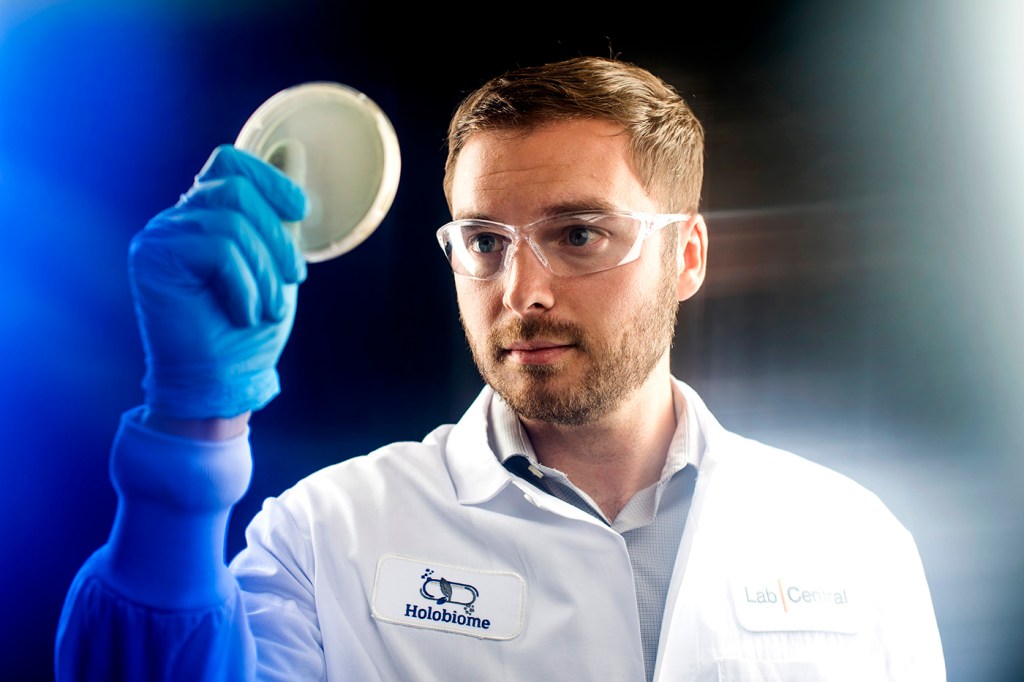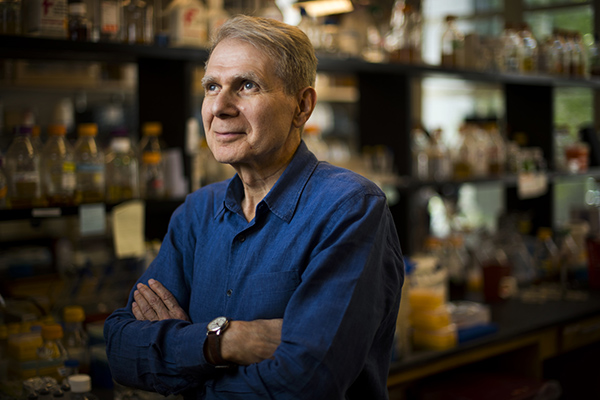Northeastern University researchers search for the key to treating clinical depression

We like to think of ourselves as individuals.
But scientists estimate that we share our bodies with 38 trillion organisms that play an integral part in keeping us healthy and making us who we are. They crawl across our skin, cling to our intestines, and generally call our bodies home.
Now, a study led by researchers at Northeastern shows that there is a potential link between the bacteria that live in our gut and clinical depression.
“In the past 10 years there has been significant work that has linked the microbiome to various components of human health and disease,” said Philip Strandwitz, who began this research as a doctoral student in Kim Lewis’ Antimicrobial Discovery Center at Northeastern. “But the general concept of delivering bacteria or manipulating gut bacteria to improve brain health is still new.”
Working with a team researching depression at Weill Cornell Medical College, Strandwitz and Lewis took fecal samples and brain scans from individuals diagnosed with depression. They found that patients with certain brain signatures associated with depression had fewer bacteria belonging to the Bacteroides genus.
Strandwitz and Lewis were looking for Bacteroides species because they had discovered that those bacteria produced an inhibitory neurotransmitter called gamma-aminobutyric acid, or GABA. GABA interferes with signals sent between nerves, keeping your brain from being over-stimulated and providing a sense of calm. When this system isn’t working properly, people are more prone to anxiety, insomnia, and depression.
In the past 10 years there has been significant work that has linked the microbiome to various components of human health and disease. But the general concept of delivering bacteria or manipulating gut bacteria to improve brain health is still new.
Philip Strandwitz, co-founder of Holobiome
“If you have low levels of these GABA-producing bacteria, that is associated with brain signatures of depression. It’s a pretty strong correlation,” said Lewis, who is a University Distinguished Professor of Biology. “That opens up the intriguing possibility of treating depression with GABA-producing bacteria.”
Scientists are still figuring out exactly how microbes in your gut communicate with your brain. Just this September, researchers announced that they had discovered a new type of cell in the lining of the intestine that seems to provide a direct link. Those cells connect to the vagus nerve, which stretches from the brain all the way to the abdomen, Strandwitz said.
“It’s like a highway of communication from the brain to the gastrointestinal tract,” Strandwitz said. “As it turns out, about 80 percent of signaling that happens along the vagus doesn’t go from the brain to the gut. It goes from the gut to the brain.”
Gut microbes have been found to affect the brain through the immune system and hormone pathways as well.
“To be perfectly honest, this is a wild, wild frontier right now,” Strandwitz said. “We’re learning so much about ourselves and the brain is no longer this magical organ in isolation. Instead, it’s obviously connected to all facets of our being, and it turns out microbes are part of that.”
The researchers uncovered the link between Bacteroides species and depression after they discovered a different intestinal microbe, which exclusively requires GABA to grow. Strandwitz and Lewis have named it Evtepia gabavorous—the GABA-eater.

“It’s remarkable,” Lewis said. “I’ve been doing microbiology for a very long time and I have never encountered, and the profession has never encountered, a bacterium that eats one thing and only one thing: GABA.”
The researchers were able to use this unusual property to figure out which bacteria from the human gut could produce GABA. If Evtepia gabavorous would grow next to another species in a petri dish, that microbe must be making GABA.
“The question is, what is the relevance to us of what goes on in the gut between GABA producers and consumers?” Lewis said. “Are we tuned into the microbial life centered around this neurotransmitter of ours?”
It certainly seems possible. This new research adds to a growing body of work linking our microbes to GABA levels. A 2017 study showed that transplanting gut microbes from lean individuals into obese individuals resulted in higher amounts of GABA in the blood. Other bacteria-based treatments have increased GABA levels and changed depression-like behaviors in mice.
“A lot of questions remain,” Strandwitz said, “but we’re actively pursuing this hypothesis in larger human studies.”
By manipulating the communities of bacteria in our bodies, researchers may be able to find new treatments for depression and other disorders. Strandwitz and Lewis, along with fellow Northeastern graduate Michael LaFleur, co-founded a company called Holobiome in 2015 to explore these microbiome-based therapies.
“By studying microbial communities in people, and soil, and marine environments, wherever it might be, there is a good chance we can bring improvement to the world,” Strandwitz said. “With that comes a re-understanding of not just bacteria, but also part of us. And I think that’s really spectacular. We’re never in isolation.”
For media inquiries, please contact Shannon Nargi at s.nargi@northeastern.edu or 617.373.5718.





